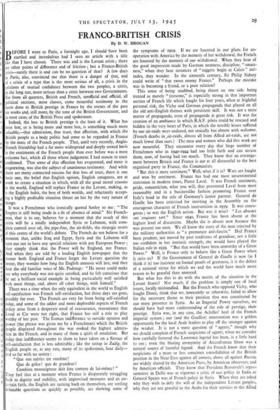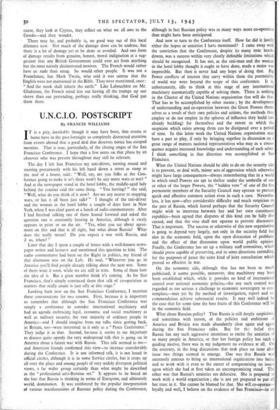FRANCO-BRITISH CRISIS
By D. w.
BROGAN
EFORE I went to Paris, a fortnight ago, I should -have been D startled and incredulous had I seen an article with a title like that I have chosen. There was and is the Levant crisis ; there are other points of difference and of friction ; but a Franco-British crisis—surely there is and can be no question 'of that? A few days in Paris, alas, convinced me that there is a danger of that, and 3f a crisis of a type that is the most serious of all, a crisis. in the relations of mutual confidence between the two peoples, a crisis, in the long run, more serious than a crisis between two Governments. For from all quarters, British and French, unofficial and official, all political sections, most classes, came mournful testimony to the harm done to British prestige in France by the events of the past ie six weeks and, still more, by the tone of the British Government, and
d
in most cases of the British Press and spokesmen.
Indeed, the loss to British prestige is the least of it. What has ; been lost, or is being more and more lost, is something much more tr valuable,—that admiration, that trust, that affection, with which the British people as a body politic had come to be regarded in France by the mass of the French people. That, until very recently, Anglo- French friendship had a far more widespread and deeply rooted basis in the sentiments of the French people than ever before was a most welcome fact, which all those whose judgement I had reason to trust confirmed. That some of that affection has evaporated, and more is evaporating, was also the subject of unanimous testimony. And while there are many connected reasons for that loss .of trust, there is one basic one, the belief that English egoism, English smugness, are at work to create a situation in which, with all the good moral reasons in the world, England will replace France in the Levant, making, as is the English habit, the best of both worlds, and reluctantly accept- ing a highly profitable situation thrust on her by the very nature of things.
It was a Frenchman who ironically quoted Seeley to me : " The Empire is still being made in a fit of absence of mind." No French- man, that is to say, believes for a moment that the result of this crisis will be a totally independent Syria or Lebanon, with com- plete control over oil, the pipe-line, the air-fields, the strategic assets of this centre of the world's debate. The French do not believe for a moment that, unlike Iraq and Egypt, Syria and the Lebanon will turn out not to have any special relations with any European Power ; they simply think that the Power will be England, not France.
And when they are told by a leading English newspaper that the sooner both England and France forget the Levant question the better, they wonder how long the English amnesia will last, and they hear the old familiar voice of Mr. Podsnap : " He never could make out why everybody was not quite satisfied, and he felt conscious that he set a brilliant- social example in being particularly well satisfied with most things, and, above all cther things, with himself."
There was a time when the only equivalent in the world to English self-satisfaction was French self-satisfaction, but those days are gone, possibly for ever. The French are very far from being self-satisfied today, and some of the odder and more deplorable aspects of French policy arise from a desperate need of reassurance, reassurance that Laval et Cie were not right, that France has still a role to play worthy of her past. The Roman indifference to outside opinion and power (the phrase was given me by a Frenchman) which the British people displayed throughout the war evoked the highest admira- tion in the French, and in many of them a spirit of emulation. But today that indifference seems to them to have taken on a flavour of self-satisfaction that is less admirable ; like the satrap in Zadig, the English people or, at any rate, many of its spokesmen, hear daily— and so far with no satiety : "Que son merite est extreme!
Que de grace! que de grandeur!
Combien monseigneur doit etre content de lui-memo! "
They feel that at a moment when France is desperately struggling back to dignity and stability, with improvised measures and an un- certain faith, the English are turning back on themselves, are settling debatable questions as quickly as possible, are showing some of
to
to
s- f-
te
s. f-
the symptoms of 1919. If we are haunted in our plans for co- operation with America by the memory of her withdrawal, the French are haunted by the memory of our withdrawal. When they hear of the good impression made by German nearness, discipline, " smart- ness," when they hear instances of " niggers begin at Calais " atti- tudes, they wonder. In the sixteenth century, Sir Philip Sidney could write of " that sweet enemy France." Perhaps the mistake was in becoming a friend, or a poor relation?
This sense of being snubbed, being thrust on one side, being treated as merely " tiresome," is especially strong in that important section of French life which fought for four years, often at frightful personal risk, the Vichy and German propaganda that played on all the old anti-English themes with persistent skill. It was not a mere matter of propaganda, even of propaganda at great risk. It was the creation of an ambiance in which R.A.F. pilots could be rescued and hidden in the very heart of Paris, in which the terrible losses suffered by our air-raids were endured, not stoically but almost with welcome. (French deaths in air-raids, almost all from Allied air-raids, are not much fewer than ours.) The men and women who did this work are now mournful. They encounter every day that large number of Frenchmen who in 1940-1944 had too little faith and can accuse them, now, of having had too much. They know that an estrange- ment between Britain and France is not at all distasteful to the best organised party in France, the Communists.
" But this is mere sentiment." Well, what if it is? Wars are fought and won by sentiment. France has had one most unsentimental statesman in modern times, Pierre Laval. It was French sentiment, pride, romanticism, what you will, that prevented Laval from most reasonably and in a businesslike fashion promoting France over Italy's head to the role of Germany's junior partner. General de Gaulle has been criticised for insisting in the Assembly on the courageous character of French intervention in 1939. It was coura- geous ; so was the English action. But was it wise? "Les absents not toujours tort." Since 1940, France has been absent at the highest level of discussion. Maybe she is absent now because she was present too soon. We all know the story of the man rejected by the military authorities as " a premature anti-fascist." Had France been prudent, not moved by past traditions of grandeur, not a little too confident in her intrinsic strength, she would have played -the Italian role in 1939. " But that would have been unworthy of a Great Power." Well, is France only to behave like a Great Power when it suits us? If the Government of General de Gaulle is now (as I think it is) too insistent on formal proofs of greatness, it is the defect of a national virtue for which we and the world have much more reason to be grateful than annoyed.
But what has this to do with the merits of the situation in the Levant States? Not much, if the problem is simply one of local issues, locally mishandled. But the French who opposed Vichy, who fought Dentz, think that we, innocently or otherwise, failed to allow for the necessary threat to their position that was constituted by our mere presence in Syria. As an Imperial Power ourselves, we should have had more understanding of the role of prestige, their prestige. Syria was, in any case, the Achilles' heel of the French imperial system ; our (and the Gaullist) intervention was a golden opportunity for the local Arab leaders to play off the stronger against the weaker. It is not a mere question of " agents," though why we should complain of French suspicions of agents, when we consider how carefully fostered the Lawrence legend has been, is a little hard to see ; even the blazing anonymity of Aircraftsman Shaw was a natural source of harmful legend. And the French know that their suspicions of a more or less conscious consolidation of the British position in the Near East against all corners, above all against Russia, are widely shared by the Ainerican Press, by American observers, and by American officials. They know that President Roosevelt's repre- sentative in Delhi was as vigorous a critic of our policy in India as General Spears was of French policy in Syria. When they are asked why they wish to defy the will of the independent Levant peoples, why they are not grateful to the Arabs for their services to the Allied cause, they look at Cyprus, they reflect on what we all owe to the Greeks—and they wonder.
There may be, and probably is, no good way out of this local dilemma now. Not much of the damage done can be undone, but there is a lot of damage yet to be done or avoided. And one form of damage results from genuine, honest, moral indignation at a sug- gestion that any British Government could ever act from anything but the most naively disinterested motives. The French would rather have us rude than smug. So would other people. It was not a Frenchman, but ,Mark Twain, who said it was untrue that the English were not mentioned in the Bible. They were mentioned, once :
• " And the meek shall inherit the earth." Like Labouchere on Mr. Gladstone, the French mind less our having all the trumps up our sleeve than our pretending, perhaps really thinking, that God put them there.



























 Previous page
Previous page